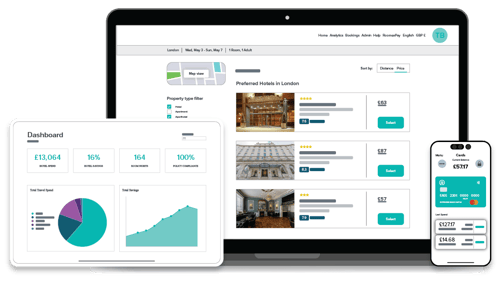At any given time a large proportion of your workforce may be on the road. This is particularly true in certain industries, such as construction, engineering and manufacturing for instance.
And as these industries ease themselves back into business travel, it’s useful to have an updated business travel checklist to ensure all the essentials are thought of. Not only will this benefit employees, but it should form part of your organisation’s duty of care too.
When it comes to corporate travel management, here are 11 key things to think about when making travel bookings.
Book early
It’s not just for peace of mind. Booking accommodation and transfers as early as possible, allows you to benefit from early savings. If you have the bonus of an online travel management company, you’ll also benefit from further discounts which are shared with preferred partners. The key here though is to book as early as possible.
Cost saving options
In these austere times, cost-savings and budget management is a priority. Without squeezing the joy out of business travel, it’s worth considering if there are any ways to make savings. For instance, booking flexible tickets to avoid potential cancellation fees, car-sharing, room-sharing and booking a hotel that includes free gym access for workers on location for lengths of time.
Covid safety policy
While restrictions and Covid protocols are no longer legally enforced, it’s still important as a responsible employer to lay down your Covid safety policy and share this with employees in advance of work trips. This should highlight your expectations from employees when traveling, what to do in the event of having Covid-19 (before, after and during trips), as well as safety policies around protecting others. This should be located within your corporate travel policy and regularly updated too.
Factor in transfer time
If you’re putting an itinerary together for colleagues, always factor in enough time for delays, cancellations and transfers. Especially at the moment with travel disruption being high, it’s especially beneficial.
Paperless tickets
In these digital times, it’s easy to forget that paperless tickets are the new norm. If you’re booking corporate travel UK for other colleagues, then remember to share all the booking details with them, including tickets, QR codes and booking passcodes. Since minimalist business travel is the future, it’s well worth investing in a ‘cloud’, app, or online sharing system, for ensuring everything is located in one place.
Link to the business travel policy
Bookings aside, it’s always useful to share your corporate travel policy with colleagues before a trip. This should provide guidance around expenses, travel and cancellation when working away from home.
Connectivity
Whether colleagues are located in a hotel, Airbnb or a rented apartment, you’ll need to consider connectivity. WiFi is an essential part of remote working, now more than ever.
On-site facilities
Even on a limited travel budget, companies need to give due consideration to employee wellbeing. This is especially true when colleagues are working away for longer periods of time (weeks sometimes months) without home comforts to hand. This means ensuring they are well located to nearby restaurants, supermarkets and petrol stations, as well as have easy access to a local gym or exercise facility. Even if this means paying a premium for a central location, it’s something that corporate travel managers need to prioritise.
Travel insurance
The important matter of travel insurance needs to be on your business travel checklist. It’s wise to organise this as early as possible, since it will cover the traveller for any unforeseeable cancellations prior to the trip, as well as incidents during.
Out-of-hours contact
Although this should already be covered in your corporate travel policy, it’s always helpful to highlight out-of-hours contacts for emergencies. This should include key phone numbers for cancellations, customer services and private medical care, if applicable. You can avoid many issues by using a booking platform that carries out reservation checks with hotels ahead of your employee’s arrival.
Create a call sheet
And finally for your business travel checklist, once everything is booked and secured, it’s helpful to produce a call sheet/itinerary/schedule. Typically, this will include all the ticketing and booking information, along with exact dates and times of travel, and accommodation details. You might also want to include some local information, including nearest medical assistance and support.
If you’re looking for a trusted all-in-one solution for workforce travel and expense management, visit Roomex to find out more.

September 21, 2022

